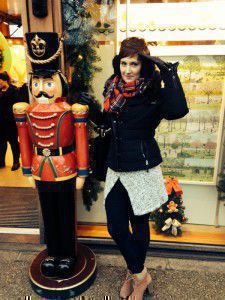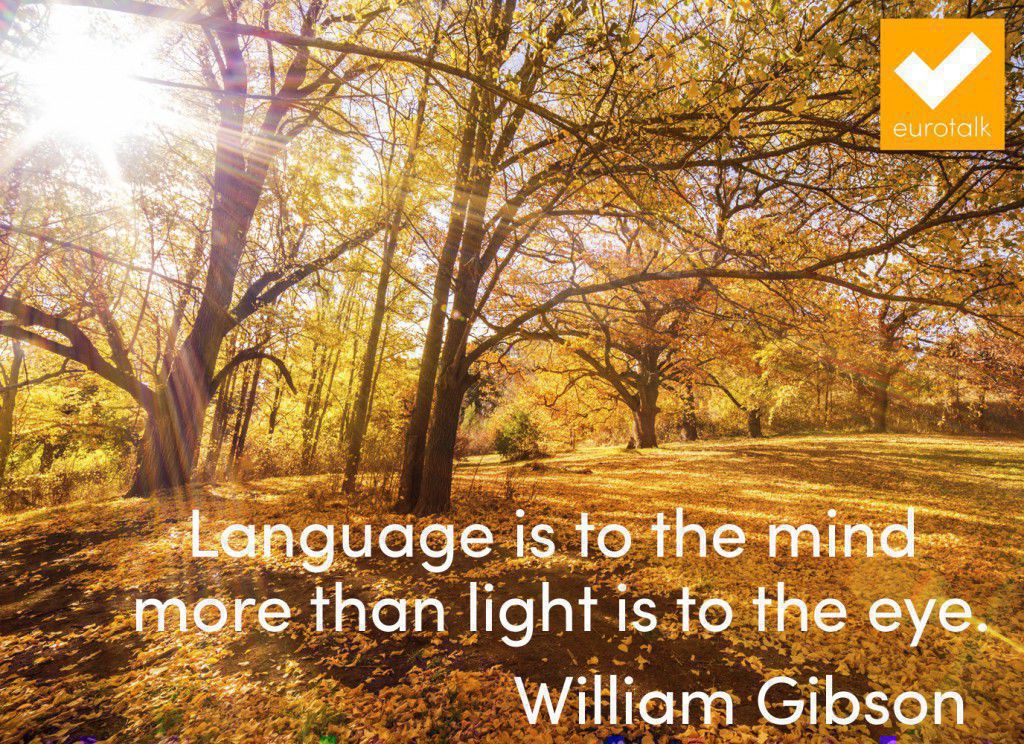10 sport stars who speak other languages
 It can often feel like life is all about sport, whether we like it or not. But have you ever wondered how good sports stars are at languages?
It can often feel like life is all about sport, whether we like it or not. But have you ever wondered how good sports stars are at languages?
It turns out, pretty good. Like anyone who has to travel a lot for their work, athletes often find knowing only their native language isn’t enough. Here are 10 great examples of sports stars who speak more than one language.
Gary Lineker
Besides English, the former footballer learnt Spanish while he was playing for Barcelona, and picked up some Japanese when he later moved to Nagoya Grampus Eight. He’s now a passionate ambassador for languages in schools, saying in an interview with TES last year, ‘the learning of languages, for me, will always be helpful for the vast majority at some stage in their life’.
Roger Federer
Not content with winning a frankly quite ridiculous 17 Grand Slam titles, the Swiss tennis player also speaks four languages fluently – his native Swiss German along with French, English and German. He’s known for his ability to switch effortlessly between languages in interviews and press conferences and can quite comfortably answer journalists’ questions in their own language, a feat some of his fellow tennis players can’t keep up with. Wouldn’t be the first time.
Tom Daley
The British diver recently got an A in his Spanish A-level (congrats, Tom!), and makes good use of his language skills when in Mexico, where he spends a lot of his time. Here’s a video of him showing off his Spanish.
Jonny Wilkinson
Here in England, Jonny Wilkinson is known (at least by me) as that guy who’s pretty good at drop goals. But he’s also a bit of a superstar in France, where he’s been playing for Toulon since 2009. He’s now fluent in French and was awarded honorary citizenship of Toulon earlier this week – giving his acceptance speech in the local language, of course.
Fernando Alonso
The Spanish Formula One racing driver speaks an impressive four languages – Spanish, Italian, English and French. And in case that’s not enough, he’s apparently working on Russian too.
Arsene Wenger
The Arsenal manager is well known for his interest in languages, speaking French, English, German, Spanish, Italian and Japanese. Like Gary Lineker, Wenger’s also known as an ambassador for languages, and last year he was voted Britain’s first Public Language Champion by readers of The Guardian. In this video he explains why languages are so important.
Novak Djokovic
Never one to let Roger take all the glory, fellow tennis champion Novak Djokovic speaks five languages – Serbian, English, German, Italian and French. He studied English and German at primary school, and learned Italian when he worked with coach Riccardo Piati. In an interview with Tennis Talk in 2013, he said, ‘We have a saying in our country: The more languages you know, the more is your worth as a person. I like to understand what people are saying wherever I am, at least to pick up a few phrases of those languages.’
Paula Radcliffe
Long-distance runner Paula Radcliffe has a first-class degree from Loughborough University in European Studies, and speaks French and German fluently. She now lives in Monaco with her husband and two children, who are both bilingual, attending a French school but also fluent in English.
Cesc Fabregas
Another Barcelona footballer, Fabregas speaks four languages – Spanish, Catalan, English and French, and his Twitter feed is multilingual. When asked about his language skills in 2005, he replied, ‘These days you have to keep studying, not least because my mum tells me so.’ Words to live by.
Daniela Hantuchova
And finally, another tennis player, because tennis is my favourite. Daniela Hantuchova, from Slovakia, is by all accounts a very talented lady. Besides her tennis career, she’s also a trained classical pianist, and speaks – wait for it – six languages: Slovak, Czech, English and German fluently, and some Croatian and Italian.
Does anyone else feel like a bit of an underachiever now, or is it just me?
If you know any other examples of sports stars who speak other languages, please tell us about them in the comments.
What language does the voice in your head speak?
In today’s day and age, a great percent of the people travel, either for vacations, business or even a longer period of time, in search of a better job, better opportunities, to be with the loved ones and why not, just for the sake of a multi-cultural experience. While some of us learn a new language as a hobby or in school, migrants find that it is difficult to live in a country whose language you can’t speak. So this is where we get to the point of this article: how does it feel to speak another language than your native one, every day with everyone.
 First of all, let me take you on a history trip back in the ‘90s. No, we’re not going to listen to Backstreet Boys, instead I’m going to tell you how our generation got to learn English from TV back in Romania. There was a single cartoon program back then, Cartoon Network, and it wasn’t dubbed in Romanian (like it is now), nor did we have subtitles. So we’d just watch the cartoons without completely understanding what they were saying (not that there was much conversation, but still) and I would occasionally ask my parents what does this/that mean. From the age of eight we’d eventually start learning English in school, but by then it already sounded familiar and we would only add the grammar to the equation.
First of all, let me take you on a history trip back in the ‘90s. No, we’re not going to listen to Backstreet Boys, instead I’m going to tell you how our generation got to learn English from TV back in Romania. There was a single cartoon program back then, Cartoon Network, and it wasn’t dubbed in Romanian (like it is now), nor did we have subtitles. So we’d just watch the cartoons without completely understanding what they were saying (not that there was much conversation, but still) and I would occasionally ask my parents what does this/that mean. From the age of eight we’d eventually start learning English in school, but by then it already sounded familiar and we would only add the grammar to the equation.
Growing up, we had daily contact with American English from movies and music and by the time I finished high school I’d already got a certified advanced level.
So I was quite confident in my English; I got the chance to use it for both of the jobs I had in the years I worked in Romania, and I got along really well with the people I’d have to speak in English on the telephone or in meetings.
Last year, when I moved to London I was rather surprised to find that I couldn’t understand what these people were saying. I panicked at first but then I realised that no one is expecting me to be 100% fluent in English so I started asking questions or asking people to repeat so that I can understand properly. As I said, most of the English vocabulary I had was American, so I started picking up the differences like, ‘mug’ not ‘cup’, ‘biscuits’ not ‘cookies’ and ‘fringe’ not ‘bangs’.
At first I found it quite exhausting, and at the end of the day I wasn’t able to concentrate anymore or to use more complex words. With time, I got used to it and I started learning more and more words and expressions that I would afterwards try to use in conversations (like for example ‘I’m skint’, which means ‘I’m broke’). Also, in the first months here, I used to get nervous at the supermarket or whenever a unexpected conversation would start, fearing that I won’t find my words or that I wouldn’t remember certain things. With time, I started gaining more confidence and now, after ten months, I am easily able to have a conversation, express my feelings and ideas accurately and understand almost all what the other person is saying. I still have trouble understanding different English accents, and I would probably see myself stuck in a conversation about, let’s say, gardening tools – so certain topics with a specific word-pool.
You know how in your native language you can express your feelings and state of mind by the words you choose and by your tone of voice? Well, good luck doing that when you only know a single set of words for each thing. Also, studies have shown that sometimes people find that they can speak more freely in a non-native language because they don’t feel that the words ‘really’ belong to them, they’re not ‘their’ words.
But what happens when you spend more than half of the day speaking a different language? Your brain starts to associate certain situations, new situations that you didn’t have to deal with in your home-country, with a certain language – this is when you start to ‘think’ in another language. Some people associate this moment with the moment you start to feel like you belong to a certain culture, that your roots are starting to clench to the ground and now you’ve become (or at least moved closer to being) one of ‘them’.
So I’ve found myself in situations in which it was easier for me to express myself using an English word rather than a Romanian one, either because I found that it sounded better or because I couldn’t think of a proper translation.
It’s funny how the brain works sometimes – I got a call at work today from a business partner that also speaks native Romanian, so naturally I started talking to her in Romanian and found it very difficult to find the right words or to build the sentences without sounding stupid. I felt like I had to do a reverse-translation of what I would normally say in English.
At the end of the day, I can agree that using multiple languages really does wonders for your way of thinking and for the structure of your thoughts. Like Nelson Mandela once said, ‘If you talk to a man in a language he understands, it goes to his head. If you talk to him in his language, that goes to his heart.’
Ioana
Quote of the week: 31 May 2014
“Language is to the mind more than light is to the eye.” William Gibson
For more like this, find us on Pinterest.
Embed This Image On Your Site (copy code below):
Will online translators make language learning redundant?
Microsoft have just unveiled the latest version of their Skype Translator, which will enable us to chat with people all over the world even if we don’t speak their language. This story ran in the Daily Mail here in the UK yesterday, under the rather depressing headline, ‘Don’t bother learning a foreign language! Skype will soon translate spoken foreign words in real time’.
I can definitely see that this innovation has its uses, particularly if you need to speak to a client or colleague in another country, and don’t have time to learn their language. And I’m in no way trying to undermine all the years of research that have gone into its development – it looks incredibly clever and impressive. But I think it’s unrealistic to believe that it’s going to make language learning redundant.
For one thing, I haven’t had a lot of faith in translation software since the time I needed to write an email to a colleague in Dutch. Since the only Dutch I know is ‘waar is de winkel?’ (‘where is the shop?’) and ‘de tweemansbob’ (‘two-man bobsleigh’), naturally I turned to Google Translate, copied and pasted the offered translation and sent the email, feeling pretty proud of myself. Until my colleague replied, telling me – in English – to never use Google Translate for Dutch again, because what I’d sent him made no sense at all. Hard to tell by email, of course, but I always picture him wiping away tears of laughter as he wrote his reply.
This was a few years ago, and I realise things have come on a bit since then. But these days if I have to use an online translation tool, I’ll always copy the text back in and check it makes sense in English before I hit send. And even then I’m never completely convinced I haven’t made some horrible mistake. As with any translator, if you don’t know the language at all, you have to put complete faith in the intermediary to correctly translate what you’ve said. With people, you can generally tell if they know what they’re talking about. With computers, it’s not so easy – especially given that this particular innovation also relies on speech recognition technology to even decide what needs translating in the first place.
I’m no expert but I’d assume most people with a need for the Skype Translator will be those needing it for business calls, and in that case you definitely need to know your translator is 100% reliable, or who knows what you could end up agreeing to? Presumably those who call friends or family through Skype will already know at least a little of the other person’s language – unless they’re calling their in-laws, in which case it’s possibly even more important to avoid embarrassing translation mistakes.
Secondly, even if I were completely confident that the translator was accurate, I’m not sure I’d want to use it. The brilliant thing about video call software like Skype is that it allows you to talk face-to-face with someone on the other side of the world, where before they would have been a disembodied voice on the phone or, even more impersonal, a written letter or email. Microsoft describes the translator as ‘human to human interaction’ but it’s not really – it’s ‘human to computer to human’, and what you hear is not your friend or colleague but a computer-generated voice giving you the translation of what they’re saying.
Personally, I’d rather do a bit of preparation, then fumble my way through a conversation, probably in a mix of languages and littered with mistakes, than have to sit and wait for a program to decide what it thinks I said and pass it on. Not only that, but making the effort to learn at least a little of the other person’s language shows respect for them and their culture. It’s well known that speakers of other languages would much rather you try, and get it wrong, than sit back and let a computer do all the work.
Finally, as we all know, there are no end of benefits to learning a language, far beyond making it through one Skype call. We’ve covered all these benefits elsewhere, so I won’t go into them all again. And in fairness, I don’t think Microsoft are trying to replace language learning. But I can’t agree with the Daily Mail‘s headline – just because a machine exists that can help us out in a tight spot, it doesn’t mean we should never make the effort to learn a language again. Language learning is as important as it’s ever been, if only to avoid an embarrassing situation like this, when we’re forced to leave the computer behind…
(Apologies in advance to any Italian speakers!)
Liz
10 Reasons to Visit… Pittsburgh
We love sharing our reasons to visit different places around the world, but we also enjoy hearing from you. Is there somewhere we’ve missed that you want everyone to know about?
Today we’re hearing from Emily Nemchick, who lives in Pittsburgh, Pennsylvania, with her top ten reasons to visit the city.
1. The Museums
Although many Londoners might baulk at having to pay to enter Pittsburgh’s museums, they are well worth a visit if you’re in town. Pittsburgh’s Carnegie museums offer a whole day’s worth of fun for art or history lovers. The Andy Warhol museum is also worth looking up for pop art fans, and the Mattress Factory is the perfect day trip for enthusiasts of quirky and imaginative art installations.
2. Mt. Washington
Mt. Washington offers some of the best views of Pittsburgh’s downtown, rivers and gorgeous skyline. Though it has a reputation as a rust-belt city, Pittsburgh’s setting at the confluence of the Ohio and Monongahela rivers makes for some extremely worthwhile vantage points from Mt. Washington’s overlook. Plus, if the season is right, Mt. Washington has some pretty darned good ice cream, too.
3. The Three Rivers Heritage Trail
Anyone who likes to bike or hike should definitely give Pittsburgh a go. Not only does it have trails aplenty, it boasts a biking trail that stretches from downtown Pittsburgh all the way to Washington D.C. For less adventurous bikers or those questing for a quiet stroll, there are also shorter riverside trails, which are a great way to see Pittsburgh whilst enjoying a bit of nature.
4. Local Cuisine (Pierogies!)
Pittsburgh has strong Polish heritage, and as such a local favourite is pierogies. If that isn’t your thing, there are still countless local restaurants offering a range of tasty cuisines. There are great places scattered all over town. Try Primanti Bros for a real taste of traditional Pittsburgh fare – their specialty is sandwiches with chips (French fries) and coleslaw inside the sandwich. It’s pretty decent, actually.
5. Pirates, Penguins and Steel
Not too many actual pirates or penguins unfortunately, but Pittsburgh’s sports teams might make up for the lack if you’re into American football, baseball or ice hockey at all. Pittsburgh’s PNC Park is a huge sports stadium which is a great place to catch a game if you’re in the Burgh during baseball season.
6. The Strip District
This is my absolute favourite place to be in Pittsburgh. The Strip District isn’t as naughty as it sounds, but it’s a great place to spend the afternoon nonetheless. The Strip is a long street boasting specialty cheese stores, coffee shops, fishmongers, butchers, baked goods, spices, open fruit and veg markets and a ton of great bars and restaurants. Anything you want to buy, you can buy in the Strip. It’s also a great place just to window shop and hang out.

7. Phipps Conservatory
Pittsburgh not only has awesome museums but a pretty nifty conservatory chock full of gorgeous flowers and plants. The exhibits change with the seasons, but they are always worth a visit.
8. The South Side
Anyone in search of some nightlife should check out the South Side, home to the happiest happy hours, the hippest clubs (I would assume from their long lines on Saturday nights) and the hoppiest bar hops (I wanted to keep that going there, but seriously, good bars). The South Side is a great place to go out to dinner, grab a few drinks or have a night out on the town affordably.
9. Station Square
Station Square is a fun place to check out some nice boutiques or head to a fancy restaurant. In the summer, it’s also the ideal place to break up a bike ride with a rest and a drink, because it’s right on the South Side bike trail. You can even roll your sightseeing into one and hop on the Incline (cable car) down from Mt. Washington. Pittsburgh is pretty pocket-sized, so it’s a great place to explore on foot, and Station Square is a fun and convenient addition to any itinerary.
10. Breweries
I confess, I saved the best until last. Pittsburgh is the home of many fantastic breweries, and locally brewed beer is pretty epic. Church Brew Works is a must-see as a brewery built inside a converted church, East End Brewing Co. has some tasty seasonal brews, and even whiskey fans can enjoy Pittsburgh’s locally distilled whiskey at Wigle.
It may not be the most glamorous city, but Pittsburgh has tried hard to change its traditional image as a rust-belt city and is regarded as one of America’s most livable cities. It’s guaranteed to keep tourists happy for days too. Stop by if you get a chance!
By Emily Nemchick, English expat and happy Pittsburgh resident.
Website: http://emilynemchick.weebly.com/
Blog: http://londontopittsburgh.wordpress.com/
Do get in touch with us if you’d like to share a ’10 reasons’ post of your own, or you have a suggestion for where we should cover next.


